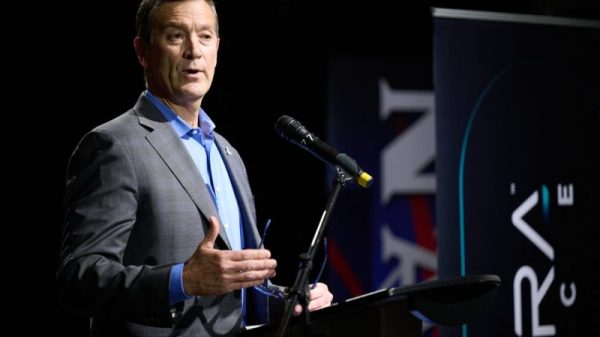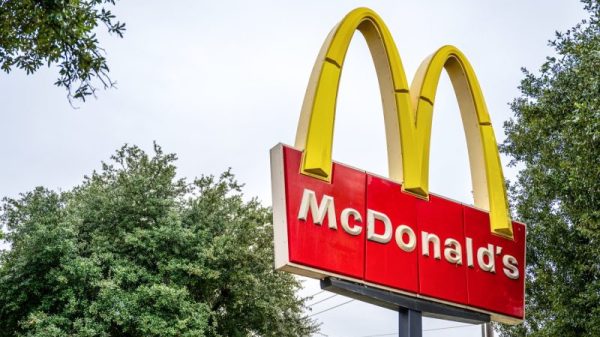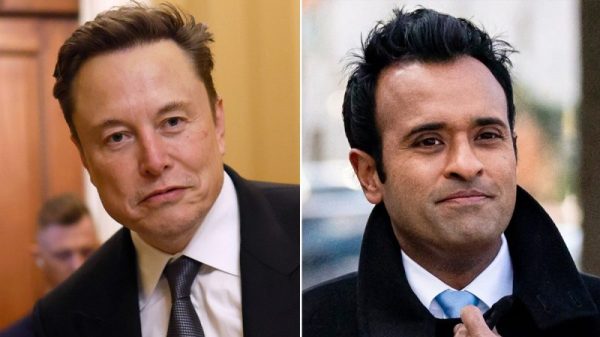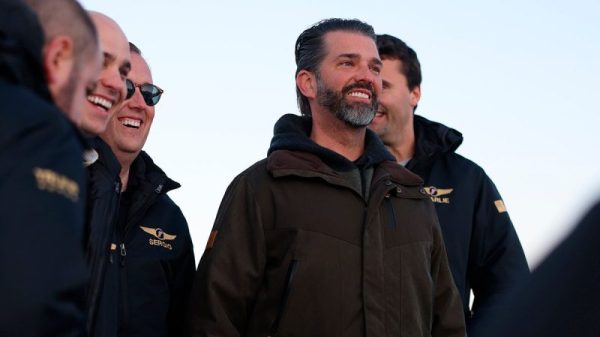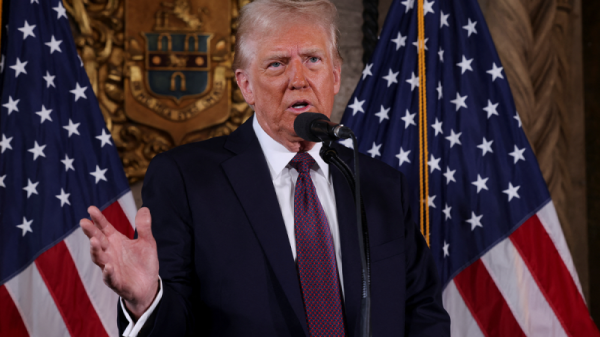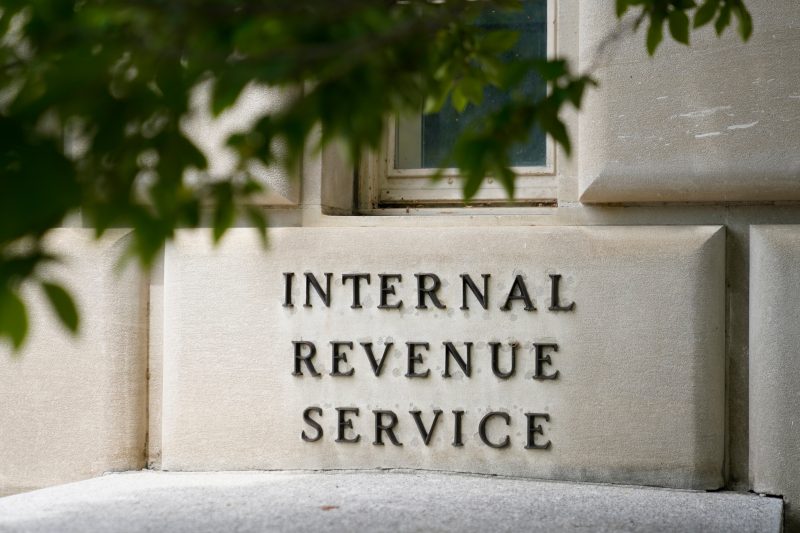A former IRS contractor who leaked a slew of confidential tax records filed by the wealthiest Americans, including those of President Donald Trump, is scheduled to be sentenced Monday by a federal judge in Washington.
Charles Littlejohn pleaded guilty last year to one count of unauthorized disclosure of income tax returns, a rarely prosecuted crime that carries a maximum sentence of five years in prison. Littlejohn, 38, admitted that he leaked Trump’s confidential tax information to the New York Times in 2019 and then replicated his work the next year, filtering the tax returns and financial data of thousands of wealthy Americans to ProPublica.
The news organizations published reports showing how Trump and the richest Americans for years paid little or no federal taxes. U.S. District Judge Ana C. Reyes, who will be handing down Littlejohn’s sentence, emphasized at his plea hearing in October that “there will be serious consequences for this illegal act.” Regardless of Littlejohn’s motivations, the judge said, “people taking the law into their own hands is unacceptable.”
Justice Department officials said Littlejohn’s disclosures were unprecedented in U.S. history. In court filings, they described how Littlejohn closely studied the IRS systems he would later breach with sophisticated digital techniques meant to hide his tracks. Rather than entering search terms such as “Trump” into an agency database, Littlejohn used broad parameters “designed to conceal the true purpose of his queries,” U.S. officials said. Littlejohn learned that IRS protocols could block large downloads from the agency’s systems, but in November 2018, he “exploited a loophole” by sending the data he found to a private website he had set up, according to the Justice Department.
He then transferred the data onto portable storage devices, including an Apple iPod he had outfitted as a personal hard drive, prosecutors said. For the ProPublica leak, Littlejohn uploaded reams of tax information to a private website using “two virtual machines (essentially simulated versions of physical computers),” which he destroyed shortly after the data transfers, according to prosecutors.
Littlejohn “weaponized his access to unmasked taxpayer data to further his own personal, political agenda, believing that he was above the law,” prosecutors in the Justice Department’s Public Integrity Section wrote in a legal brief, requesting that he receive the maximum prison term of five years.
“A free press and public engagement with the media are critical to any healthy democracy, but stealing and leaking private, personal tax information strips individuals of the legal protection of their most sensitive data,” prosecutors Jennifer Clarke and Jonathan Jacobson wrote. “Everyone is entitled to equal protection under the law.”
Defense attorneys for Littlejohn requested a prison term of eight to 18 months, arguing that his offenses were “the product not only of his misguided idealism but of life experience that led him to treat each day as if it were his last,” including the death of his younger sister in 2013 and his father’s disease diagnosis in 2019.
The attorneys wrote that after leaking Trump’s tax data to the Times, but before his disclosures to ProPublica, Littlejohn was deeply influenced by “The Triumph of Injustice: How the Rich Dodge Taxes and How to Make Them Pay,” by economists Emmanuel Saez and Gabriel Zucman.
“The 2019 book set forth a systematic analysis of the U.S. tax system, concluding that for the first time in a century, billionaires almost universally paid lower effective tax rates than the average American taxpayer,” attorneys Lisa Manning and Noah Cherry said in a court filing.
But they added that Littlejohn soon came to regret his actions and, once he was under investigation, spoke to a federal watchdog agency, the Treasury Inspector General for Tax Administration, about ways to “better detect and deter future theft and illegal disclosure of IRS data.”
“He originally acted out of a sense of moral duty, but soon came to understand that his conduct was morally wrong,” Manning and Cherry wrote. “Instead of saving the tax system, his actions had undermined the IRS, breached the public trust, and violated the privacy of thousands of American taxpayers.”
Reyes said at the October plea hearing that the House Committee on Ways and Means obtained five years of Trump’s tax returns through legal means, after winning a years-long court battle, and that Littlejohn’s actions risked damage to the U.S. taxation system by eroding the public’s expectation of privacy in their most sensitive financial information.
After being elected in 2016, Trump reneged on a promise to release his tax returns. In an editor’s note accompanying the first article based on Littlejohn’s disclosures, the Times’s then-executive editor, Dean Baquet, wrote: “Every president since the mid-1970s has made his tax information public. The tradition ensures that an official with the power to shake markets and change policy does not seek to benefit financially from his actions.” When Littlejohn pleaded guilty last year, a Times spokesman said, “We remain concerned when whistleblowers who provide information in the public interest are prosecuted.”
Federal prosecutors said in a court filing this month that ProPublica “has continued to publish stories using the data disclosed” by Littlejohn even after he pleaded guilty. The news organization’s reports lay out how many of the richest Americans, including Jeff Bezos, Bill Gates and Elon Musk, employ financial strategies to slash their federal tax bills. (Bezos owns The Washington Post.)
Neither the Justice Department nor Littlejohn’s attorneys have named the private company where he worked at the time of the breaches. However, in a newsletter published in 2008 by the economics department of the University of North Carolina at Chapel Hill, which Littlejohn had attended, he wrote that he joined the consulting firm Booz Allen Hamilton after graduating in 2007 and that his work there involved the IRS.
According to court documents filed with the October plea agreement, Littlejohn worked for the same consulting firm “from 2008 to 2010, from 2012 to 2013, and from 2017 to 2021.” Booz Allen Hamilton did not respond to requests for comment.
Prosecutors said Littlejohn sought to rejoin the firm in 2017 “with the hope and expectation of accessing and disclosing” Trump’s tax data, and “reorganized his entire life around this crime.” Defense attorneys said Littlejohn excelled at his work, started an online poker analytics business while on a break from consulting and “will never again have access to tax records, or any other confidential government information.”






